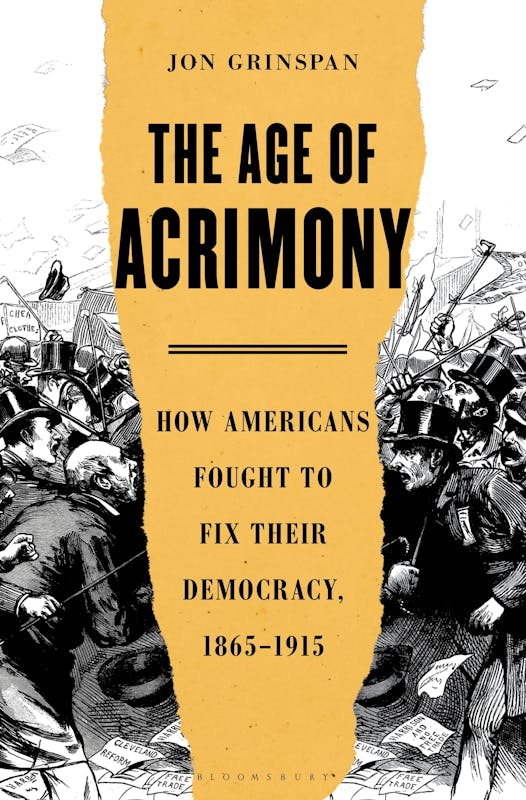The level of rancor in contemporary American politics is disconcerting, but in certain respects, it's nothing new. Jon Grinspan's brisk, edifying book chronicles an era of "tribal partisanship" and "self-perpetuated political tension and violence," one in which voters elected unqualified blowhards and pundits sought to abolish the Electoral College.
Though the themes explored in "The Age of Acrimony" speak to our current predicament, the events themselves took place between 1865 and 1915.
In those years, three presidents (Abraham Lincoln, James A. Garfield and William McKinley) were assassinated. White racists terrorized and lynched countless African Americans. Criminal acts and unconscionable laws prevented Black people, women and many others from voting. Child labor was common. Deceitful party bosses wielded vast power. Increasingly well-funded campaigns resembled a spectator sport. Many Americans, Grinspan writes, "refused to distinguish between politics and entertainment."
A political-history curator at the Smithsonian, Grinspan enlists a large cast of tenacious optimists and mercurial opportunists. Together, their biographies illuminate a half-century of strife and grudging reform.
William Kelley, a longtime Philadelphia congressman, was a talented orator. His calls to extend voting rights to African Americans earned him a knife attack from a Southern politico — one of the era's countless fits of political violence. Kelley zealously backed controversial policies meant to protect domestic businesses, Grinspan notes, becoming the country's "foremost tariff crank." Noble on some issues, shortsighted on others and always eager to argue with his critics, Kelley exemplified a distinctly American archetype.
Kelley's daughter played her own part in the day's defining struggles. A socialist who translated the work of "Communist Manifesto" co-author Friedrich Engels, Florence Kelley helped liberate children from grueling jobs, Grinspan writes, "weighing and measuring young workers to document" their plight. She and fellow reformers deserve credit for the eventual adoption of "child labor laws and pure food acts and vaccination campaigns."
Then there was Ignatius Donnelly, a Minnesota congressman and lieutenant governor, an author of popular pseudoscientific books and an exuberant speaker who was not above describing his constituents as "Drunken Norwegians … very stupid & myself more so." Anticipating the 21st-century Americans who would renounce both major parties, Donnelly, a self-described "political 'What is it,' " helped form the fleeting Populist Party.
Reconstruction, the Gilded Age, the Jim Crow South and the Progressive Era already have their definitive texts, and this relatively modest book won't displace them. But Grinspan has skillfully assembled a roster of memorable personalities who embody some of the era's vicissitudes. The people in these pages didn't "fix" the republic's problems, of course, as the subtitle suggests ("How Americans Fought to Fix Their Democracy, 1865-1915").
Frequently, though, they prodded America to fulfill its founding promises, stepping into starring roles in this admirable portrait of a nation enduring a prolonged identity crisis.
Kevin Canfield is a writer in New York City.
The Age of Acrimony
By: Jon Grinspan.
Publisher: Bloomsbury, 384 pages, $30.

The 5 best things our food writers ate this week

A Minnesota field guide to snow shovels: Which one's best?

Summer Camp Guide: Find your best ones here

Lowertown St. Paul losing another restaurant as Dark Horse announces closing


